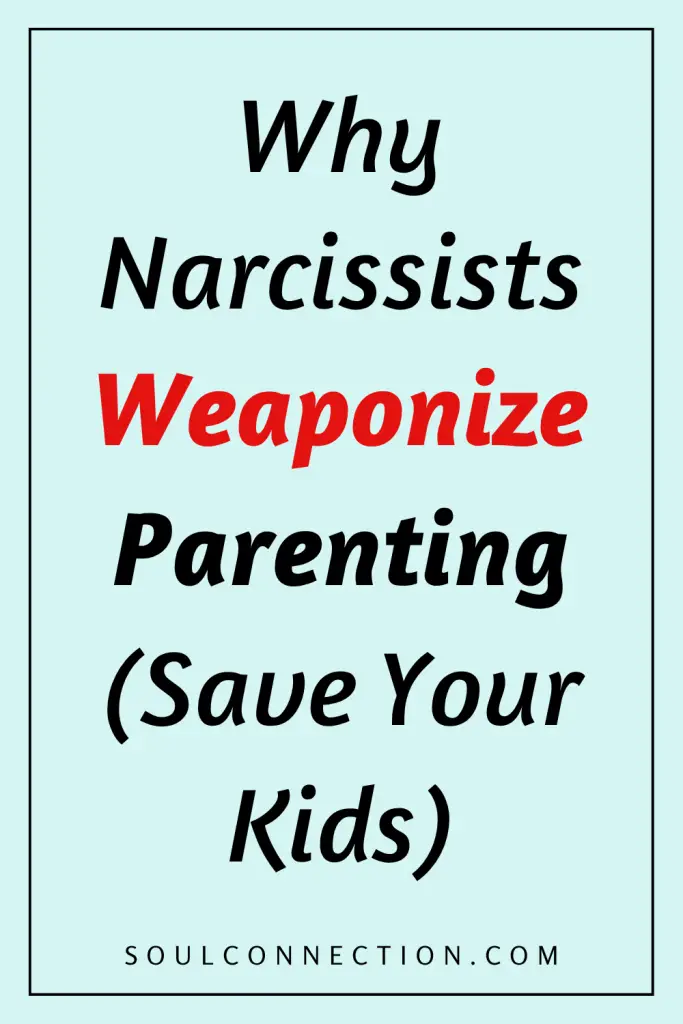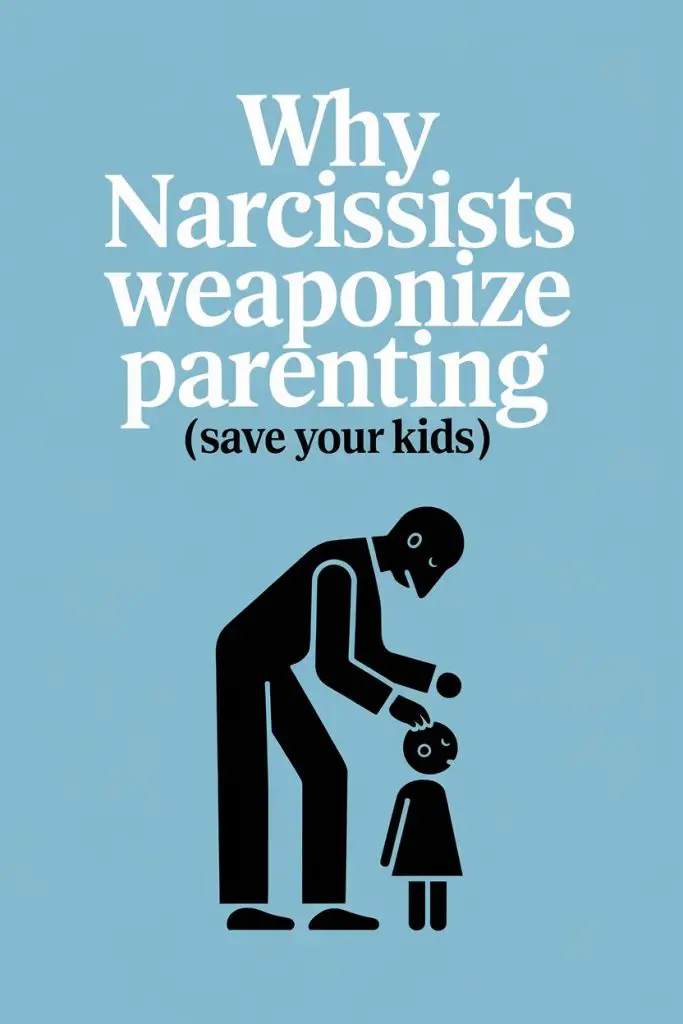Someone once said parenting is the hardest job you’ll ever love. They didn’t mention it could be the most complicated battlefield, especially when tangled with a narcissist.
If you’ve ever wondered why your ex (or current partner) treats your kid’s birthday like an Olympic sport or why even school pickups turn into power plays, you’re not losing your mind. There’s a method—albeit a twisted one—to the madness.
Here’s a look at why narcissists weaponize parenting, how it warps family life, and most importantly, what you can do to protect both yourself and your kids from becoming collateral damage.
Why Narcissists See Kids as Pawns
To a healthy parent, children are living, breathing bundles of love, chaos, and untold expense. To a narcissist, children can morph into pawns on the chessboard of adult drama.
This isn’t because the narcissist loves the kid less. In fact, it’s rarely about love at all.
Narcissists view parenting as an extension of their ego. Children become trophies, status symbols, or even weapons to be wielded against the other parent.
Affection, time, and attention are rationed based on compliance and loyalty. If you feel like your child’s affection is being auctioned off to the highest (or most manipulative) bidder, you’re not imagining things.
Control Is the Name of the Game
Narcissists are allergic to losing control. Co-parenting with one? You’ll notice that any perceived threat to their authority—from your new haircut to your kid’s preference for your bedtime stories—can spark all-out warfare.
Parenting decisions may be sabotaged simply because the narcissist didn’t suggest them. Joint agreements might be ignored, just to prove a point.
Even the most mundane decisions turn into territory disputes. Yes, picking a soccer league can rival Brexit negotiations.
Kids often become the rope in this tug-of-war, pulled between two parents as the narcissist tries to dictate every detail, big or small.
They Thrive on Triangulation
Ever notice how drama seems to multiply in their presence? Narcissists adore triangulation—bringing in a third person (often your child) to stir the pot, create confusion, and keep you off balance.
Your child may be given information about grown-up problems, asked to “report back,” or encouraged to take sides. Suddenly, you’re defending yourself to a six-year-old about why you supposedly “don’t care” or “aren’t as fun.”
Narcissists aren’t above spreading misinformation to win sympathy or loyalty from the kids, leaving you to play defense in your own home.
Emotional Manipulation Disguised as Parenting
A narcissist’s toolkit is overflowing with guilt trips, gaslighting, and emotional booby traps. One minute, they’re the world’s best parent, lavishing attention and gifts; the next, they’re cold and withdrawn if their child expresses love for you.
Kids internalize these mood swings, learning to tiptoe around the narcissist’s feelings. They quickly figure out which topics are off-limits and which behaviors will get them praise (or avoid the silent treatment). It’s emotional blackmail with a bedtime story.
The Smear Campaign
When the relationship sours, the narcissist may double down on making you look like the villain. Suddenly, you’re the “neglectful” parent or “the reason we can’t have nice things.”
Social media rants, gossip with the school staff, even passing digs in front of the kids—nothing is off limits.
This isn’t just mean-spirited. It’s a calculated effort to undermine your credibility, isolate you, and make the child question their own loyalty.
Co-Opting Special Events
Birthdays, holidays, graduations—these milestones should be about the kids. For narcissists, they’re prime opportunities to steal the spotlight or undermine you.
Ever had a co-parent throw a lavish birthday bash the weekend before your planned party, then act wounded that the kid is “too tired” to enjoy your celebration? Been upstaged by an “unexpected” trip to Disneyland that just so happened to clash with your custody weekend?
It’s not an accident. Narcissists crave the role of the hero or victim and will hijack special occasions to cement their place in the center of attention.
Gaslighting Your Parenting
Gaslighting is the narcissist’s favorite party trick: twisting reality until you question your own sanity. This can show up as subtle digs (“Are you sure she should eat that?”), overt criticisms (“You’re ruining his confidence”), or rewriting history (“Remember, you agreed to this.”).
Kids aren’t immune to this either. They may begin to doubt their own experiences, especially if the narcissist is adept at rewriting the narrative to paint themselves as the victim or savior.
Setting Up Your Kid for Loyalty Tests
Narcissists have a knack for making children feel responsible for their happiness. “You’re the only one who understands me,” or “Don’t tell your mom/dad about this, they wouldn’t get it.”
These loyalty tests are designed to build a secret alliance with the child—one that puts them at odds with you.
This emotional tug-of-war asks kids to pick sides, damaging their sense of safety and stability. Imagine being ten years old and feeling like you’re betraying one parent by simply enjoying time with the other.
Why This Hurts Kids (And Not Just in the Moment)
All these power games may feel like exhausting adult drama, but the real casualties are the kids. Growing up in a household where love feels conditional and loyalty is a bargaining chip can leave deep scars.
Children may struggle with anxiety, self-esteem issues, or difficulty trusting others. They’re at higher risk for repeating toxic patterns in their own relationships down the line.
Even if they seem “okay” in the moment, the confusion and stress can show up years later.
Spotting the Signs
Worried your co-parent is weaponizing your children? Here are some telltale signs:
- Your child parrots negative things about you that sound suspiciously adult.
- Sudden mood swings or anxiety around transitions between homes.
- The narcissist refuses to stick to agreements, then blames you for the chaos.
- You’re constantly defending yourself against accusations—often invented.
- Your child feels responsible for a parent’s feelings or “keeping the peace.”
If any of this is ringing bells, you’re not alone, and you’re certainly not crazy.
What You Can Do Tonight
Dealing with a narcissistic co-parent is a marathon, not a sprint. But there are things you can try right away:
Keep communication businesslike. Imagine you’re emailing a prickly HR manager, not an ex. Stick to the facts, avoid emotional bait, and document everything. (Future-you will thank you.)
Don’t badmouth the other parent. Your child needs to know you’re their safe place. They can figure out the truth over time—kids are remarkably perceptive. Let them come to their own conclusions.
Validate your child’s feelings. If they come home confused or upset, listen and reassure. “That sounds tough. I love you no matter what.” No lectures or detective work required.
Establish routines and boundaries. Consistency is your best weapon. Predictable routines help kids feel safe, even amid chaos.
Seek support. You’re not in this alone. Lean on friends, family, or a therapist who gets it. There’s no medal for suffering in silence.
When the System Lets You Down
Family court is not always equipped to spot narcissistic manipulation. Judges see limited snapshots; narcissists see the courtroom as a stage.
Documentation helps, but so does managing expectations. Focus on what you can control—your own behavior and the environment you create for your child.
Sometimes, legal intervention is necessary. If there’s abuse or your child’s well-being is genuinely at risk, don’t hesitate to get professional advice.
Even then, the narcissist may try to spin the narrative. Stay grounded, keep records, and prioritize your child’s needs.
Teaching Your Kids Resilience
Kids can survive and even thrive, despite exposure to a narcissistic parent. What helps? Unconditional love, clear boundaries, and the freedom to be themselves. Help them name their feelings, problem-solve, and practice self-care.
Model healthy relationships wherever possible. Even if the other parent is a walking red flag factory, your child can learn what respect, kindness, and empathy look like.
And don’t forget the power of humor. Sometimes, the best medicine for narcissistic nonsense is a good laugh, a hug, and a reminder that home is a safe haven.
Raising Kids Who Know Their Worth
Narcissists may weaponize parenting, but you can arm your kids with the tools they need to outgrow the drama. Every loving interaction—every bedtime story, every “I’m proud of you,” every moment of listening—helps your child build resilience.
Keep fighting the good fight. Your kids don’t need a perfect parent. They need a present one.
And rest assured, there’s no stronger shield against narcissistic games than love, honesty, and the occasional cheesy dad joke.
Your kids are worth it. You are, too.


